Online Cultural Relic Episode Seven |Booklet Hailed German Businessman for Great Love
On November 19, 1937, the International Committee for the Nanking Safety Zone was set up; three days later, on November 22, German businessman John Rabe was selected as the committee’s chairman. The committee immediately designated an area covering about 3.86 square kilometers in the northwestern district of Nanjing as the Nanking Safety Zone, where 25 refugee camps were set up. This area protected more than 250,000 refugees during the Nanjing Massacre.
To express thanks to Mr. Rabe for his righteous acts of helping and protecting Chinese refugees, 59 famous public figures and citizen representatives, including Jinling University (today’s Nanjing University) President Chen Yuguang, and mayor of Nanjing Shen Yi, gave him a jointly signed booklet as a present in 1948. In 2005, the booklet was announced as a national first-class cultural relic.
Giving Great Love to Nanjing in Times of Danger
Rabe was born in Hamburg, Germany on November 23, 1882. In November 1931, Rabe came to work at the Siemens office in Nanjing. From then on, he was closely intertwined with the fate of the city.
In 1932, Rabe moved to a two-storey building with black bricks and gray tiles, located at No. 5 Nanjing Xiaotaoyuan (now known as No. 1 Xiaofengqiao on Guangzhou Road) near Jinling University.
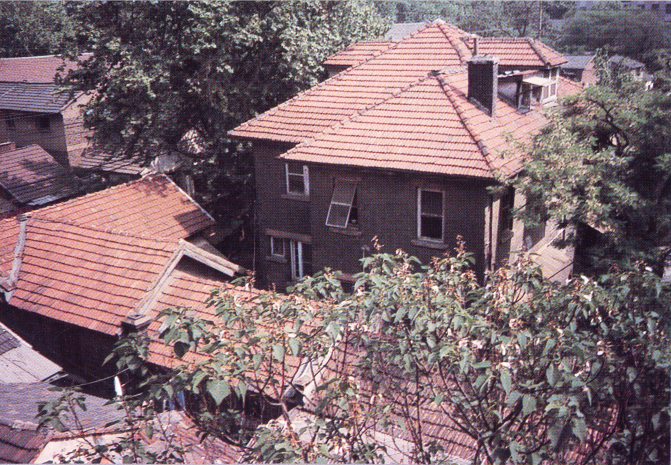
On July 7, 1937, the Lugou Bridge Incident broke out, marking the start of Japan’s all-out aggression against China. The flames of war spread to Nanjing on August 15 when the Japanese aircraft bombarded Nanjing on a large scale for the first time.
Rabe and his wife were on a vacation in Beidaihe. Recognizing the severity of the problem, he bid farewell to his wife and returned to Nanjing alone. On the table of his office in Nanjing was a letter from the German embassy in China, urging German nationals in Nanjing to evacuate as soon as possible. Through careful consideration, Rabe decided to stay despite the risks.
From September 19 to 20, Rabe experienced four air attacks launched by the Japanese planes. He asked some people to build a bomb shelter in the courtyard of his home and spread out a huge German flag on the ground, as a reminder to Japanese pilots that the house was the home of a German.
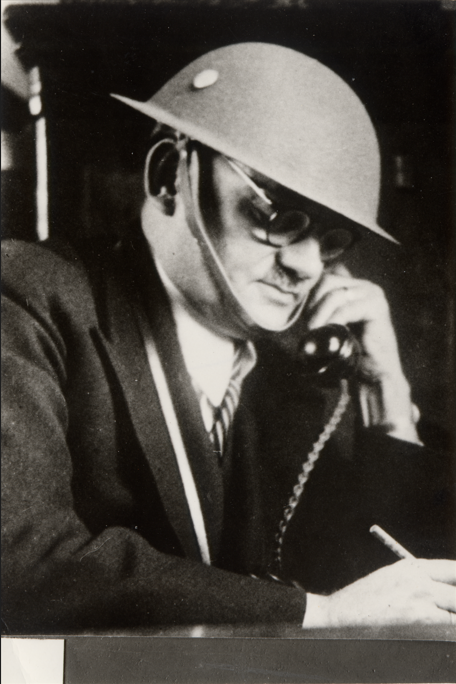
John Rabe works with a helmet in his office in Nanjing under aerial bombing launched by Japan
On November 12, 1937, Shanghai was captured. The Japanese Central China Area Army, led by Commander Iwane Matsui, also a general in the Imperial Japanese Army, advanced to Nanjing rapidly.
On November 19, Rabe learned that westerners in Nanjing set up an international committee and joined the committee at the invitation of Lewis S.C. Smythe.
On the afternoon of November 22, the international committee held a meeting to discuss its proposal for setting up a safety zone. At the meeting, Rabe was elected as the chairman of the committee for the convenience of facilitating its operation, given that Rabe was a German and Germany was an ally of Japan.
On December 2, 1937, the International Committee for the Nanking Safety Zone moved its headquarters to No. 5 Ninghai Road. Standing on the steps of the porch, Rabe and some other committee members took a group photo.
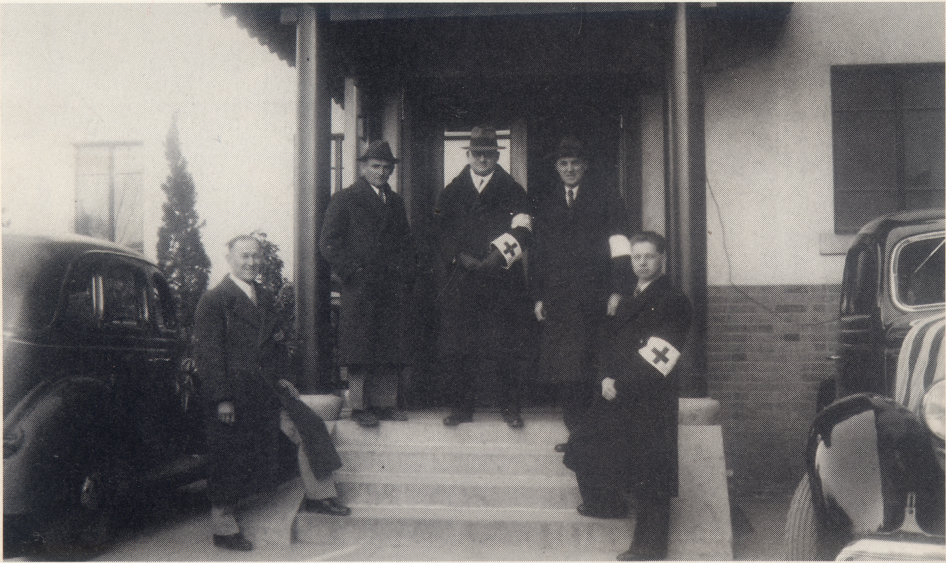
A group photo of Chairman of the International Committee for the Nanking Safety Zone John Rabe (middle) and his colleagues at No. 5 Ninghai Road
On December 13, 1937, Nanjing fell under the Japanese army and a catastrophe unprecedented in the history of human civilization began. During the Nanjing Massacre, the Nanking Safety Zone led by Rabe saved the lives of more than 250,000 Chinese refugees, including over 600 refugees who found shelter at his residence at No. 5 Xiaotaoyuan. Rabe witnessed the atrocities carried out by the Japanese troops in Nanjing and recorded what he saw and heard as well as his feelings in his diaries. The Diaries of John Rabe offered a detailed description of Japanese troops’ crimes including arson, massacre, rape and robbery, as well as how foreigners saved the refugees with great difficulty. His diaries, along with the copies of a great many photos, letters, and other writings, provided very valuable first-hand information on the Nanjing Massacre.
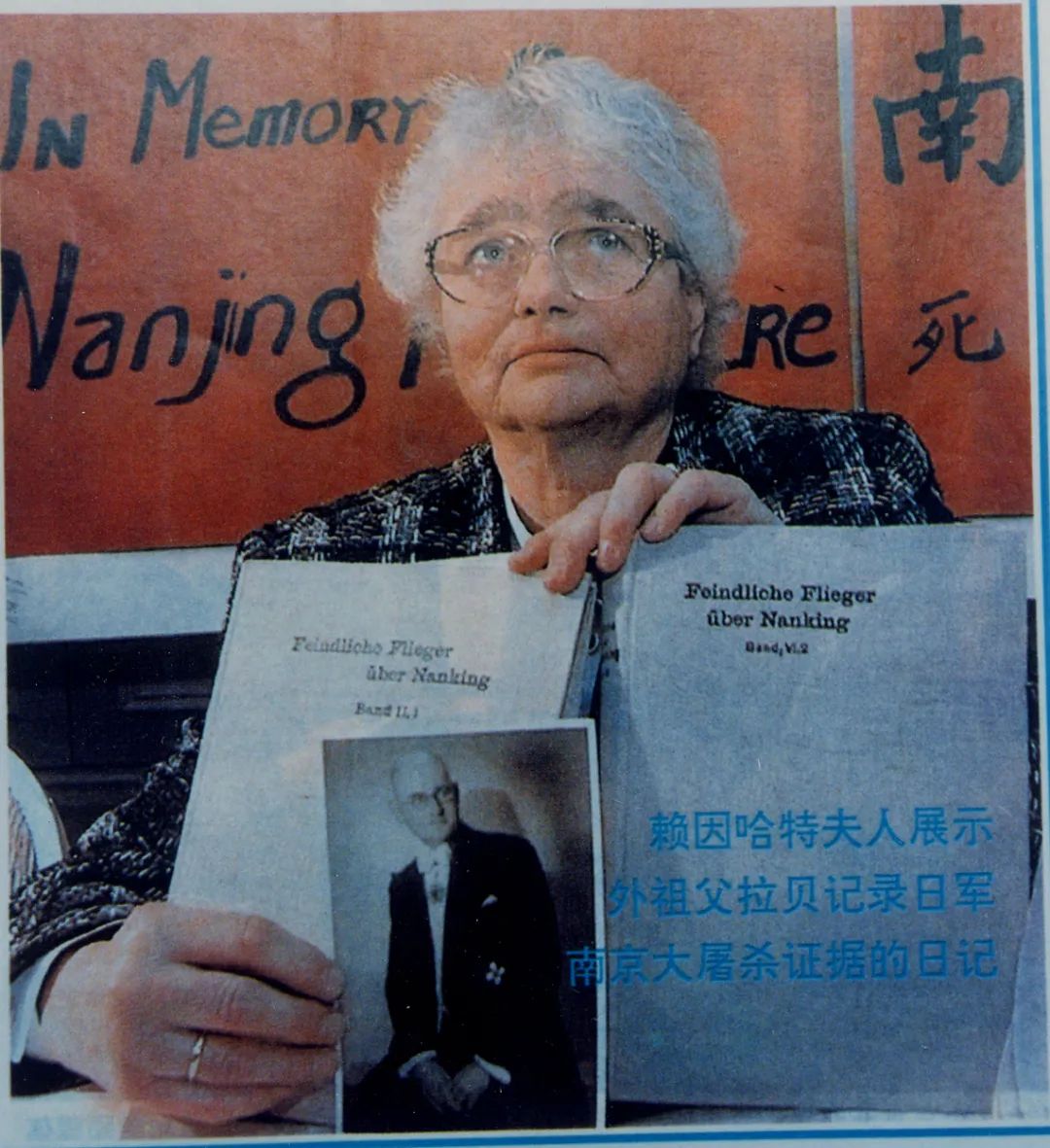
In December 1996, Ursula Reinhardt, granddaughter of John Rabe, released The Diaries of John Rabe in New York, the US after almost 59 years since its writing. The 2,460-page diaries included eight volumes.
Exposing the Atrocities of Japanese Troops after Returning to Germany
After being requested and warned by his employer Siemens to leave Nanjing, Rabe had to decide to do so in mid-February 1938. He boarded the British gunboat Bee at the Xiaguan Dwarf in Nanjing on February 23 and arrived in Berlin, Germany after nearly two months.
For five months after he returned to Germany, Rabe made various reports on the atrocities of Japanese troops in Nanjing and the life of Nanjing refugees, and he also projected the video secretly filmed by US priest John Magee in Nanjing to record such atrocities.
Rabe hoped Germany’s head of state could act based on the alliance between Germany and Japan and pressure the Japanese government into ending the gruesome situation in Nanjing. On June 8, 1938, Rabe submitted a report to Hitler about the atrocities of Japanese troops in Nanjing, only to be arrested by German secret police Gestapo. His six diaries were also taken away by the police. It was not until then that Rabe truly understood the pro-Japan policy of the German government.
Nanjing Residents Lending a Hand to Rabe in Difficulty
Siemens assigned Rabe to an ordinary “translator” post. As a low-level employee, Rabe and his family moved into an ordinary apartment in Berlin provided by Siemens, where they had only a room and needed to share the canteen with others. Later, his family moved into a house located in Wilmersdorf, Berlin.
In 1943, Rabe’s house was destroyed in a bombing. He had no choice but to move into the house of his son-in-law and live with his daughter and son-in-law. He lived there until the last minute of his life.
In 1945, Europe’s physical battles of World War II ended with the surrender of Nazi Germany. After the war, the Allies exposed the crimes of Nazi Germany. They found that the only purpose Rabe joined the Nazi Party was to set up a German language school in China and seek official funding from Germany. The Denazification Committee for the British occupied area in Charlottenburg cleared his name from Nazi in June 1946.
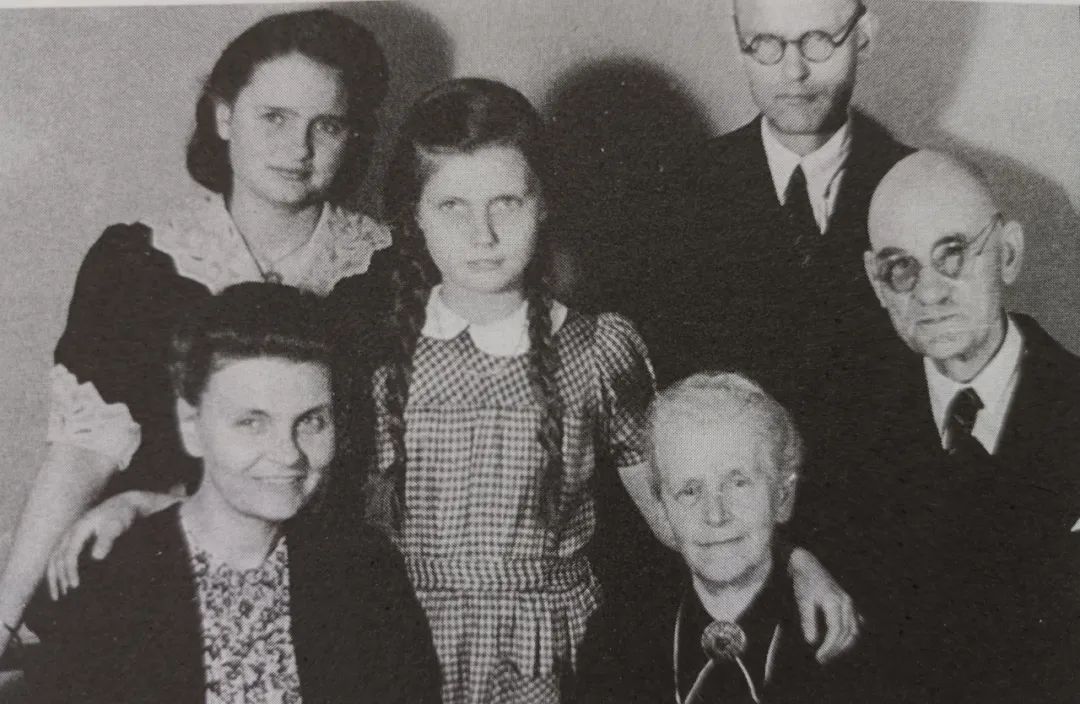
A family photo of John Rabe after World War II
That verdict brought an end to his spiritual torture, but the pressure of life still weighed heavily on Rabe. He was then having a hard time. Every day his family counted on boiling wild weeds to feed their kids while the adults survived on a little dry bread. He was plunged into breakdown and despair many times before getting a glimmer of hope from China far away in the East.
In early 1948, news about Rabe’s predicament spread to Nanjing. Nanjing residents rushed to help by donating money and supplies. Soon, they raised 100 million fabi, equivalent to 2,000 US dollars at market value. In March 1948, Nanjing National Government assigned personnel to Switzerland with the donation, where they bought dry milk, sausages, coffee, butter, jam and other food before mailing them to Rabe in four big packages. From June 1948 to April 1949, residents in Nanjing mailed a pack of food to Rabe each month. And the Chinese government promised to provide Rabe with housing and a pension for the rest of his life if he was willing to live in China.
In June 1948, Rabe sent a letter of appreciation to Nanjing, saying the kindness of Nanjing residents gave him courage and confidence to live.
The same year, 59 famous public figures and citizen representatives, including Jinling University (today’s Nanjing University) President Chen Yuguang, and mayor of Nanjing Shen Yi, gave Rabe a jointly signed booklet as a present. The booklet mentioned that learning that Mr. Rabe suffered persecution from the German Nazi Party and lived in poverty after returning to Germany, Nanjing residents who remembered how he helped them during the Nanjing Massacre expressed great concern and launched a fund-raising effort. In the end, a donation worth 2,000 US dollars and some food were sent to Mr. Rabe, and Nanjing residents made the booklet as a keepsake.
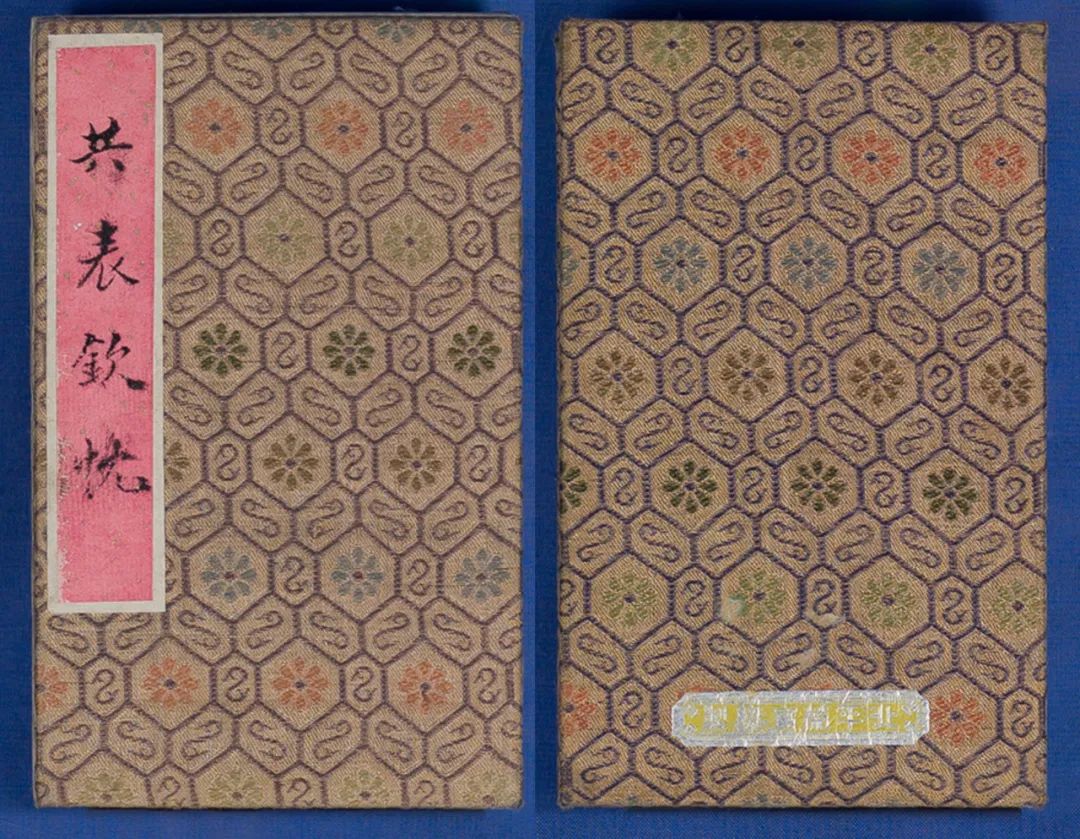
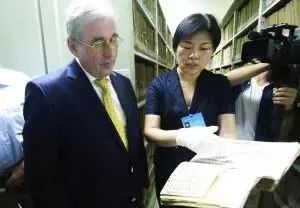
Nanjing Municipal Archives researcher Xia Bei shows John Rabe’s grandson Thomas Rabe five volumes of original historical materials recording how Nanjing residents helped Rabe’s family out of 1.1 million volumes of archives in August 2014
Nanjing Government Funding the Renewed Lease and Renovation of Rabe’s Graveyard
On January 5, 1950, Rabe had a stroke and passed away that night, at the age of 68.
After Rabe passed away, his family buried him at Kaiser Wilhelm Memorial Cemetery in the western suburb of Berlin. In Germany, there were controls over how long a tombstone can stay in a cemetery. In January 1997, Mrs. Reinhardt asked her son to bring Rabe’s tombstone back to her garage. At the same time, she and the Chinese embassy in Germany contacted the Memorial Hall expressing a willingness to donate the tombstone to the Memorial Hall. At the end of January 1997, staff members of the Chinese embassy in Germany took Rabe’s tombstone out of the house of Mrs. Reinhardt. Upon hearing the news, Air China volunteered to send a plane to carry the tombstone to China for free. That year, Rabe’s tombstone was put in the Memorial Hall.
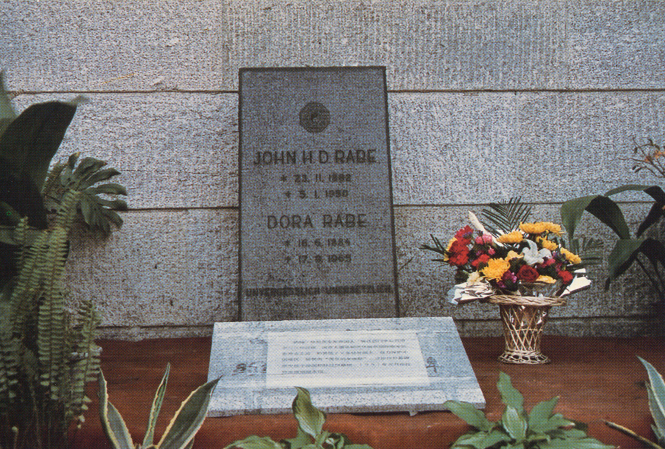
In 1997, John Rabe’s family donated his tombstone to the Memorial Hall
The same year, the Memorial Hall invited Mrs. Reinhardt to attend the opening ceremony of “An Exhibition of Historical Materials from John Rabe” in Nanjing. At the opening ceremony, Mrs. Reinhardt donated the jointly signed booklet to the Memorial Hall. In June 2005, the booklet was designated as a national first-class cultural relic.
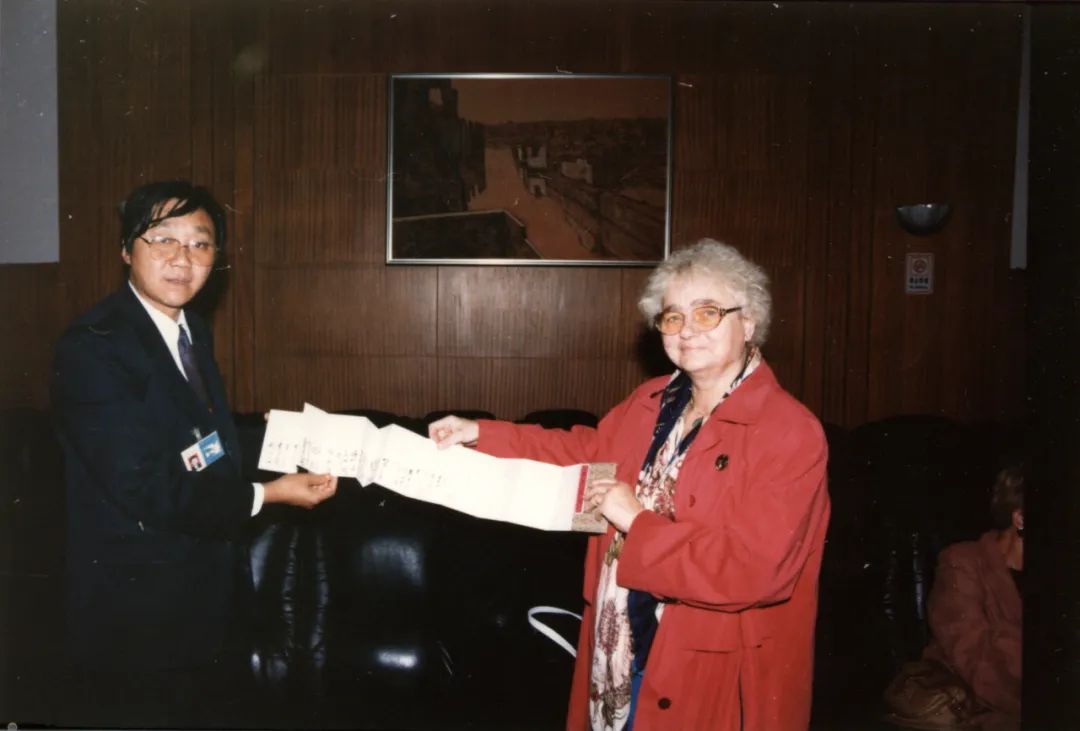
In 1997, John Rabe’s granddaughter Mrs. Reinhardt donated the jointly signed booklet to the Memorial Hall
Later, the Nanjing municipal government funded the renovation of the graveyard for Rabe and paid 40 years of cemetery fees. In December 2013, Rabe’s memorial cemetery was completed.
A Tour of Gratitude in Europe with Original Opera The Diaries of John Rabe
Starting from July 3, 2019 (Berlin time), Jiangsu Center for the Performing Arts staged its original opera The Diaries of John Rabe in Berlin, Rabe’s hometown Hamburg and other places, embarking a tour of gratitude on behalf of Nanjing residents.
At the same time, Rabe’s great-grandson Chris Reinhardt and his adopted daughter Angelina Reinhardt took part in the first Nanjing Zijin Cao International Peace Summer Camp together with some other international friends.

Chris Reinhardt (left) and Angelina Reinhardt
Nanjing Residents Offering a Helping Hand to Descendants of John Rabe during COVID-19
In March 2020, when the COVID-19 pandemic was spreading across Europe, John Rabe’s grandson Thomas Rabe asked the Chinese embassy in Germany for help. Thomas was a doctor at Medical Faculty of Heidelberg University in Heidelberg, southwest Germany and worked on the frontline against the pandemic. He said the hospital was in urgent need of anti-virus medicine.
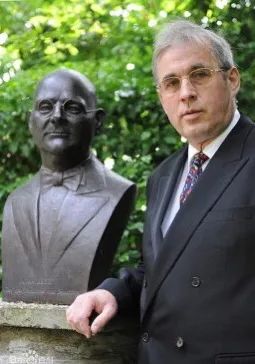
Thomas Rabe
Upon hearing the news, the Memorial Hall and medicine enterprises in Nanjing took immediate action to purchase anti-virus supplies. Soon, 620 bottles of designated medicine, 200 sets of protective suits, and 30,000 face masks were ready.
At 8 pm on April 20 (Beijing time), Thomas received the supplies that symbolized the friendship between Nanjing and Heidelberg and expressed the care and greetings from Nanjing residents across mountains and seas.

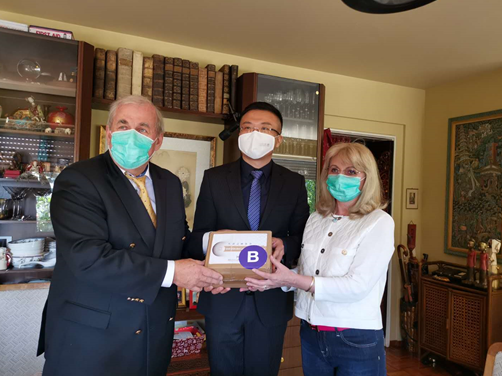
Thomas Rabe and his wife accept donated medical supplies from Nanjing, China
The sincere love toward China and Chinese people has been passed down through his family, Thomas said excitedly, adding that his grandfather showed deep love for Nanjing and Nanjing residents, with the noblest mission in his life closely connected to the city of Nanjing.
Thomas also mentioned that his father was born in Beijing and could speak fluent Chinese. Although he can’t speak Chinese, he has been in close contact with Chinese colleagues engaged in medicine and modern history research. “My children also cherish the friendship with China, and believe that this love for China will be handed down from generation to generation in the family. At this special moment when the pandemic is raging, the help from China once again shows that the Chinese people never forget their friends. I would like to express my most sincere gratitude to the Chinese government and people, to the People’s Government of Nanjing Municipality, and to the Chinese Embassy.”
Mr. Rabe, at this moment, Nanjing basks in the golden flow of Chinese parasol trees. Walk out of the Zhujianglu Subway Station and walk along the Guangzhou Road, we can find your former residence, which is very quiet. You must like the tranquility, which is totally different from the sound of gunfire and cry 85 years ago. People often come here to commemorate you with flowers in their hands. You are “a living Buddha during the Nanjing Massacre” and “China’s Schindler.” We will miss you forever.

